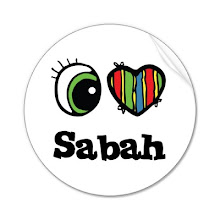 Linangoh Group
Linangoh GroupLinagoh group of woven baskets and trays are the Rungus' specialities. Made from a wild creeper known locally as 'siling kawang', these products come in different shapes, designs and sizes and suit a variety of household uses.
Most often the dried creepers are not treated with dyes so as to maintain the natural fine glossy finish.Nyiru Group
 Made from thin strips of Bemban stem, Nyiru, as the accompanying photographs show, are essentially shallow oblong or egg-shaped or round trays used as winnows for pady and other farm and household applications.
Made from thin strips of Bemban stem, Nyiru, as the accompanying photographs show, are essentially shallow oblong or egg-shaped or round trays used as winnows for pady and other farm and household applications.Rungus, a native indigenous group inhabiting the northern part of Sabah, are wellknown for their fine skills in producing these trays.
The patterns shown here are of Rungus origin. Several other indigenous groups in Sabah produce Nyiru of different patterns.
In modern homes, these items are used both as utility trays and decorative items.
Bamboo & Rattan Group
Until recent years, bamboo and rattan were there for the taking, in abundance in the bushes and jungles of Sabah.
Before the advent of commercialism, the survival instincts of the indigenous people drove them into turning the readily available raw materials into a host of practical useful items for their huts, for work in the fields, fishing or hunting.
Today, these craftsmen are turning out an even wider range of bamboo or rattan and bamboo-rattan products such as the rattan ball for sepak takraw (a national sport), the lampit (floor mat), flower vases, fruit baskets, etc. The authenticity of these traditional craftsmen have not been com promised: they are still turning our genuinely handcrafted handicrafts.
Pandan / Mengkuang Group
 Weaving is about the most common past-time of Sabah's rural womenfolk. Handicrafts classified under this group show the natives honed instincts of utilising available raw materials surrounding them.
Weaving is about the most common past-time of Sabah's rural womenfolk. Handicrafts classified under this group show the natives honed instincts of utilising available raw materials surrounding them.Pandan or Screw-pine, is widely cultivated. Mengkuang is also a kind of screw-pine. Pandan has fine and short leaves, while Mengkuang leaves are long and broad. Their uses are similar.
With the help of home-made dyes and after painstaking, crude process of turning the green pandan leaves into flexible straws, they are woven into such item as hats, mats, handbags, baskets, food covers, etc.
Pandan is so flexible and easily workable that it allows an extremely wide range of household and decorative items to be produced with the deft fingers and the in-born memory patterns of Sabah natives.












0 comments:
Post a Comment